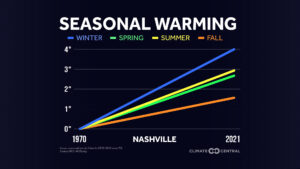
Nashville just had its second-warmest spring on record.
The city also clocked its hottest-ever average low temperature for the season, according to both the official airport station records dating back to 1940 and the National Weather Service records for Nashville dating back to 1875.
“Overall, we have seen a lot of these warming trends, especially in those nighttime temperatures,” said Wil Tollefson, Tennessee’s assistant state climatologist.
Nashville is getting warmer, on average, and the spring season is no exception. Since 1970, the average spring temperature in Nashville has warmed up by about 2.8 degrees. (Chattanooga’s spring has warmed by about 5 degrees, which is the eighth-highest spring warming in the nation, according to Climate Central.)
Warmer springs can mean earlier blooms of flowers, which can have a ripple effect on local ecosystems. This trend can also translate to more mosquitoes, longer allergy seasons, new plant hardiness zones and disrupted agriculture.
Warmer nights in Nashville
This year, spring warming was more apparent at night. Nashville had more relative warming in the average low temperature than the average maximum high during each month.
In May, Nashville’s average high temperature was 1.7 degrees warmer than the most recent 30-year average, also called a “climate normal,” while the low temperature was nearly 4 degrees warmer. In April, the high was 1.3 degrees warmer and the low was 4.5 degrees warmer than normal. In March, the high was 4.2 degrees warmer and the low was 5 degrees warmer than normal. (Nashville was also nearly 7 degrees warmer than normal in February — though that was seen more in the daily high temperatures — which influenced some of the early spring patterns.)
Nighttime temperatures are rising faster than daytime temperatures, according to the Fifth National Climate Assessment, which is the U.S. government’s most recent comprehensive climate report. The trend has been well documented during summer months: the number of nights where the temperature never falls below 70 degrees is increasing everywhere in the U.S. except the Northern Great Plains.
“Temperatures are generally lower at night, allowing human (and animal) bodies, crops, and the built environment to cool down. For that reason, an increase in the frequency and intensity of warm nights can have a significant impact on human health, crop yields, and more,” the assessment reads.
NOAA forecasts hot summer
Tennessee has been getting warmer and wetter because of climate change caused primarily by the burning of fossil fuels, deforestation and animal agriculture.
Nashville was also wetter than normal this spring, with a total of about 15.6 inches of rainfall. Nearly half of that rain fell in May — and May 9 had the largest single-day rainfall last month with 1.7 inches. Nashville’s rainstorms have been getting wetter, and one recent report found that the federal government may be underestimating the city’s flood risks.
In Nashville, and most cities in the Southeast, winter has been the fastest-warming season, while spring and summer have warmed at a similar rate.
Through May, Nashville has had the fourth-warmest year on record, and summer may also be extra hot.
Most of the nation is forecasted to be warmer than average this summer, and the National Oceanic and Atmospheric Administration has forecasted a 40 to 50% chance that Tennessee will be warmer than average.



